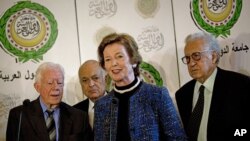UNITED NATIONS —
Diplomats say that international envoy Lakhdar Brahimi told the U.N. Security Council Wednesday that he expects the Syrian government to confirm to him by Thursday whether it will abide by a truce with opposition fighters during the Muslim Eid al-Adha holiday.
Joint U.N.-Arab League Special Representative Lakhdar Brahimi briefed the 15-member U.N. Security Council via a video link from his office in Cairo on his just-completed visit to Damascus.
Diplomats at the briefing say he told them that he had positive indications from the Syrian government of President Bashar al-Assad that it will implement a three-day truce over the Muslim holiday which begins Friday. But they cautioned that the veteran diplomat is awaiting a formal answer from the government, expected by Thursday, as to whether it will comply.
As for the various groups that make up the Syrian opposition, French Ambassador Gerard Araud said Brahimi had received some indications that they would also implement a truce.
“Mr. Brahimi said he got some assurance from the opposition that it will respond by also stopping the violence. But of course, Mr. Brahimi added that it is much more complicated with the opposition because there is no unique leadership. So it is much more complicated. But he had received some indication from the different groups," said Araud.
Russian Ambassador Vitaly Churkin said Moscow has received indications from its ally Damascus that it would implement the temporary cessation of hostilities.
With no more U.N. monitors in Syria, the Russian envoy was asked how such a cease-fire could be verified.
“It is a cease-fire which will depend on the goodwill of the parties involved. But I think the eyes of the international community are going to be fixed on Syria, so whoever breaks the cease-fire will be appropriately received in terms of the attitude of the international community," said Churkin.
An earlier cease-fire in April, negotiated by Brahimi’s predecessor Kofi Annan, collapsed within days, with both sides accusing the other of breaking it.
The Security Council welcomed the current initiative for a pause in the fighting, saying in a statement that it could be the first step towards a longer cease-fire and the launch of a political process leading to democratic change in Syria.
Now in its 20th month, the Syrian crisis is having huge humanitarian implications both inside and outside the country. More than 2.5 million people in Syria are in need of urgent assistance, while 350,000 others have fled to neighboring countries. Syrian activists and rights groups say that more than 30,000 people have been killed in the on-going violence.
Joint U.N.-Arab League Special Representative Lakhdar Brahimi briefed the 15-member U.N. Security Council via a video link from his office in Cairo on his just-completed visit to Damascus.
Diplomats at the briefing say he told them that he had positive indications from the Syrian government of President Bashar al-Assad that it will implement a three-day truce over the Muslim holiday which begins Friday. But they cautioned that the veteran diplomat is awaiting a formal answer from the government, expected by Thursday, as to whether it will comply.
As for the various groups that make up the Syrian opposition, French Ambassador Gerard Araud said Brahimi had received some indications that they would also implement a truce.
“Mr. Brahimi said he got some assurance from the opposition that it will respond by also stopping the violence. But of course, Mr. Brahimi added that it is much more complicated with the opposition because there is no unique leadership. So it is much more complicated. But he had received some indication from the different groups," said Araud.
Russian Ambassador Vitaly Churkin said Moscow has received indications from its ally Damascus that it would implement the temporary cessation of hostilities.
With no more U.N. monitors in Syria, the Russian envoy was asked how such a cease-fire could be verified.
“It is a cease-fire which will depend on the goodwill of the parties involved. But I think the eyes of the international community are going to be fixed on Syria, so whoever breaks the cease-fire will be appropriately received in terms of the attitude of the international community," said Churkin.
An earlier cease-fire in April, negotiated by Brahimi’s predecessor Kofi Annan, collapsed within days, with both sides accusing the other of breaking it.
The Security Council welcomed the current initiative for a pause in the fighting, saying in a statement that it could be the first step towards a longer cease-fire and the launch of a political process leading to democratic change in Syria.
Now in its 20th month, the Syrian crisis is having huge humanitarian implications both inside and outside the country. More than 2.5 million people in Syria are in need of urgent assistance, while 350,000 others have fled to neighboring countries. Syrian activists and rights groups say that more than 30,000 people have been killed in the on-going violence.




